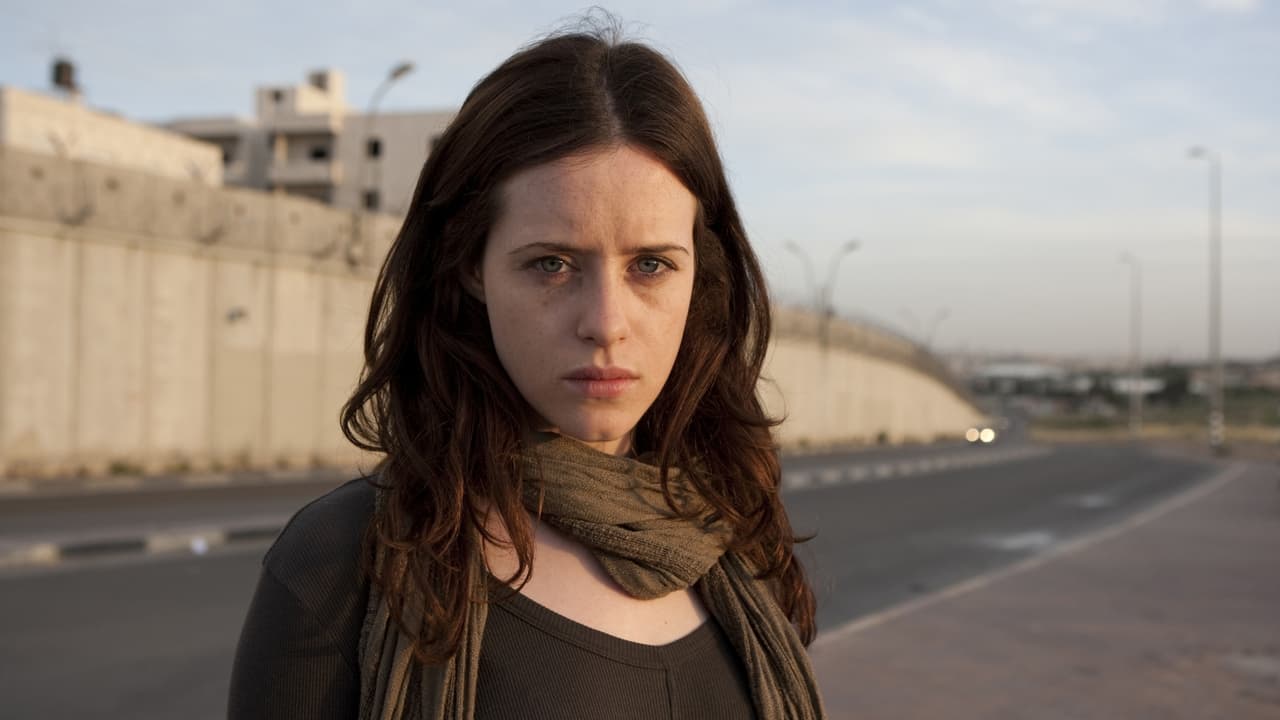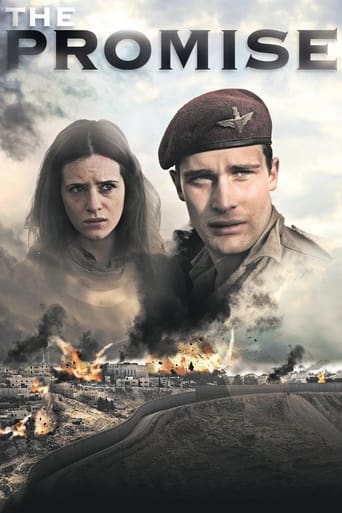Dorathen
Better Late Then Never
Bessie Smyth
Great story, amazing characters, superb action, enthralling cinematography. Yes, this is something I am glad I spent money on.
Kinley
This movie feels like it was made purely to piss off people who want good shows
Phillipa
Strong acting helps the film overcome an uncertain premise and create characters that hold our attention absolutely.
Manu Manu
I really liked the two stories of this series, if only because the past one is an almost forgotten piece of history in terms of films and TV series whereas the present story is told in a quite unbiased line; at least, as much unbiased as any story dealing with such conflict can be.While I write this review, Israel is striking Gaza with their planes, ships and artillery while Gaza is striking Israel with their rockets. It is very difficult to adopt an objective point of view of the conflict; once you get into it, you always have a tendency to lean towards one side or the other. "The Promise" criticises present-day Israeli policies in the occupied territories as well as the old days terrorist actions of the Irgun (a Jewish terrorist group), but it also creates good Israeli characters and others full of inner contradictions and moral conflicts. The Palestinian side goes cleverly untouched, with only a couple of characters with some meaning in the story. So, as a whole, I don't think it's biased at all. It just tells some uncomfortable truths.There are several striking similarities between the times of the Mandate and present-day Palestine. To begin with, Israelis achieved independence thanks to terrorism, something that Palestinians are now somehow imitating. You can choose to call them "freedom fighters" or "terrorists", but you'll have to choose the same term for both, and this is an uncomfortable truth. Other examples which have a very clear resemblance with present days Palestine resistance: Irgun kidnapping soldiers or hiding weapons in schools. All that part of the story has been forgotten for such a long time that, once rediscovered, one needs to review and update his former ideas about the conflict.Now, about the differences. The British Mandate is portrayed as a peace-keeper force supported by international law, whereas Israel in the occupied territories are portrayed as a brutal force acting against all international laws. However uncomfortable they might be, these differences are essentially true, uncomfortable truths once again. The Nakba ethnic cleansing (recently admitted and explored by Israeli historians), the suicide bombers, the deep division among the Palestinian ranks, the wall dividing Palestinian populations, the illegal settlements in the occupied territories, the underlying racism of Israeli society... all of them uncomfortable truths. Even the British abandoning the land even knowing of the massacres that were about to happen (it reminded me of the Dutch in Srebrenica). No one is left untouched in "The Promise".By the way, to conclude, what I liked the most was the extremely beautiful parallelism between the broken promise of the protagonist (Len) to protect the Arab child and the broken promise of the British troops to protect the Arab population. I somehow think that Len's tears at the end of the film were even more related to that second broken promise than to the first. A beautiful moment, I must admit.
elis-perach
I was utterly appalled at the historical distortion, bias, and horrible demonization of Israel, made by 'The Promise'. Admittedly, I only watched the last episode, so it is possible that the previous ones were more balanced, but that wouldn't make things better. In this episode the Jews are portrayed as blood-thirsty, murderous brutes, who upon withdrawal of the British mandate army, relentlessly kill defenseless and peace-loving Arab civilians, including women and children. The mighty "Jewish army" is so vicious, that even the cute family puppy-dog must be put to death to avoid a more cruel end had it fallen into their monstrous hands (bringing the soft-hearted viewer into tears)! The fact is that the Arab Higher Committee, supported by the Arab League, rejected the UN plan for partitioning mandatory Palestine even before the assembly had voted on it. The very next day following the UN voting (November 30th 1947), the local Arabs, backed by militias and armies from nearby countries, attacked the Jewish population wherever it could. The Jewish forces were defensive, trying to protect and deliver supplies to secluded Jewish towns besieged by Arab forces. In fact, things seemed so grim for the Jewish population, that in March 1948 the UN discussed proposals to withdraw from the partition plan and establish a trustee-mandate instead. So, it was the Arabs who killed Jewish civilians at that stage of the war (approx. 2,700 Jewish civilians were killed), and not the other way around, as shown in 'The Promise'. It wasn't until April 1948 that the Jewish forces became the initiating party, after the defeat of the local Arab forces. That's when some of the Arab population fled for the fear of the Jewish forces. The Grand Invasion of the Arab armies came shortly afterwards, on May 14th 1948, and only then the "Jewish army" -the IDF, was formed. In the parallel plot, which takes place around the present time, the heroine ('Erin') manages to infiltrate into Gaza, and arrives to the home of a terrorist, who recently murdered several Israelis by suicide-bombing. The close family sits there and mourns quietly. In reality, there is nothing quiet and homely about it. The terrorist organization affiliated with the murderer takes custody over the event, putting up their flags and slogans and praising the acts of the "martyr". In Gaza, civilians often spontaneously celebrate "successful" suicide bombings, and give out candy to the public. Throughout that episode, all the main characters criticize the Israeli "policy", including the Israeli soldier, 'Paul' (acted by the extreme left-wing activist Itay Tiran). When considering screen time, only a few second were dedicated to the misdoings of Palestinians, e.g., Erin reads a news report about suicide bombing, shots are fired at soldiers in Hebron. However, in the rest of the 90 minutes, the viewer experiences the conflict entirely through the eyes of the Palestinians. This is as far as it can be from "balanced". To further accentuate the differences between the Jewish population and the "oppressed" Palestinian population, Erin's parents live in an amazing villa (if not a palace) with a pond in their huge back yard. As she leaves and looks through the taxi window, the camera focuses on many other extravagant villas, contrasting the poverty of Gaza, which was captured in the previous scene. The fact is that the shots of these houses were taken in the most prestigious part of the country, occupied by the wealthiest percentile - It most certainly does not represent the way Israelis live. And by the way, there are villas even in Gaza… So why am I being so petty? Why ruin a good story with truths and facts? The real problem is that movies like this are being broadcast to millions of people, who have no significant knowledge of the conflict and its history. Their concepts and views are therefore shaped by what they see. Some of them may develop a more forgiving, or even supportive approach towards terrorist organizations that act against Israel. The public view may in turn affect these organizations, by allowing them to morally strengthen their belief in their cause, and recruit more members and resources. Eventually, it translates into blood. To summarize my review: Credibility of the story: poor. Acting: exaggerated. Adhesion to historic facts: negative 10.
kenalbertson
Some of the reviewers obviously based their rating on their personal political stance. There is a reason that this time period and the events covered in this series are very seldom the topic of film or television. Inevitably it makes the Jews look bad. After all, it was the Jews that were invading. The Arabs were defending their homes. This is not a popular subject these days. All credit to the producers and staff of this series for their courageous efforts. Having gotten that out of the way, the series held my interest, entertained me, and motivated me to further research on the time and place dealt with. In my view, this makes it worthy of praise no matter how many people try to discredit it and lower the viewer rating.
Tom
'After all, it's only fiction..' is what the author/film maker reminds us, when unable to answer some important questions about this sentimental TV series..If you're looking to be manipulated (the film starts relatively promisingly), and totally but subtly brain-washed by this pretentious project, based merely on a limited research (time & sources wise), there's a series for you! Of course, clichés are too difficult to resist (ex. the Israelis living in a luxurious villa, whereas in reality the majority of them live in simple building flats!)If you're really interested in the subject (complicated, as it is), serious sources are not lacking.. don't waste your time!

